Research Question
In today’s world, the use of e-mail has ceased to be an exclusive or elitist opportunity and has become available to all (Ceci, 2022). E-mail is a virtual way of exchanging textual and multimedia information between correspondents, working like traditional printed mail but implemented in a digital environment. The modern user is presented with a wide variety of different e-mail agents — Gmail, Yahoo, Outlook, and others — that work for both individual consumers and corporate levels (Ihsan, Chohadry, and Aslam, 2021).
In addition to the basic features, each of the systems has unique features and is qualitatively different from the competitors (Short, 2023). However, with the introduction of messengers (WhatsApp, Telegram, and others) and social networks, the need for e-mails has fallen (Cosmas, 2022). This study conducted a statistical analysis of data collected from 1010 participants to determine e-mail usage patterns and identify opportunities for improvement.
Disadvantages and Advantages
Disadvantages
As part of the survey, respondents had to identify the main disadvantages and advantages of using e-mails based on their experience. Among the main disadvantages, respondents named lack of personalization in correspondence (25.0%), damaged messages or accidental sending to wrong recipients (18.1%), overloading of mailboxes (8.1%), and loss of time (7.6%). Interestingly, respondents named duplicate e-mails or unrelated messages (40.8%), personal management issues (6.3%), and spam (4.8%) among the top contributors to wasted time.
Based on chi-square test results, χ2(12) = 23.13, p =.027, women were more likely than men to experience problems with excessive inbox loading (58% vs. 42%), lack of interpersonal interaction when using e-mail (65% vs. 35%), and twice as likely to cite lost time as a drawback of e-mail systems. There were no significant age differences in the responses.
Advantages
On the other hand, among the main advantages, sample participants named speed, reliability, and ease of messaging (65.6%), the recording of correspondence history (15.7%), and the asynchronous way of communication that allows for work-life balance. This balance should be understood as effectively distinguishing between work and personal aspects of life, not mixing the two, and not allowing one to influence the other (Kelliher, Richardson, and Boiarintseva, 2019; Bae et al., 2020). Neither age nor gender were predictors of respondents’ preferences and thus did not influence the labeling of benefits.
Sample Characteristics
One thousand ten respondents represented the study group: 34.4% (n = 347) were male, 64.4% (n = 650) were female, while 1.3% (n = 13) chose not to indicate their gender identity. The age group 41 to 50 was the most represented (31.4%, n = 317), but the 51 to 60 (28.1%, n = 284) and 31 to 40 (21.8%, n = 220) groups were also common. It should be noted that the sample was predominantly composed of respondents over 31 but under 60 years of age (Figure 1).
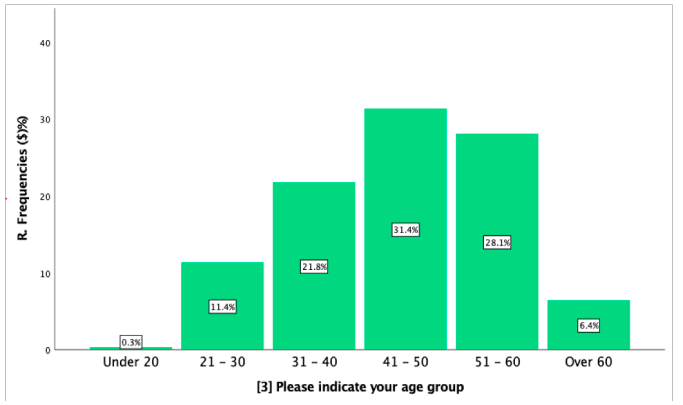
The group represented 47.6% (n = 481) of those employed in academic settings, 31.8% (n = 321) from Business Support, 16.0% (n = 162) from Middle Management, and 4.6% (n = 46) from Senior Management. Notably, 41.5% (n = 419) of the participants identified their relationship model with their colleagues as” effective, appropriate, and honest communication,” with the least (Figure 2) labeling the relationship as reliable.
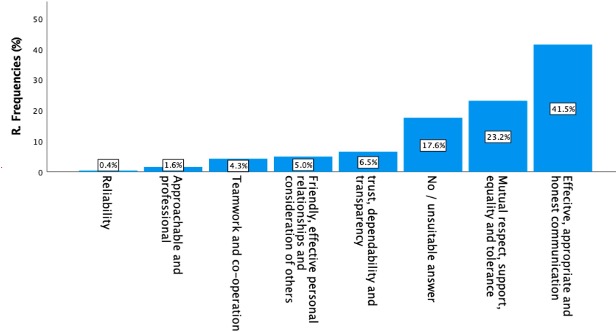
Among the most common terms when asked to describe “good working relationships,” respondents most frequently (f ≥ 50) identified “effective,” “good,” “open,” “face,” and “person” (Figure 3).

Respondents reported most frequently sending up to 10 emails per day (36.7%, n = 371) and 11 to 20 (29.8%, n = 301) — and receive 11 to 20 emails (30.7%, n = 310) and 21 to 30 (21.7%, n = 219) daily. Since the number of emails received on average is higher than those sent, it can be concluded that respondents are characterized by receiving a large number of mailings and spam (Vergelis et al., 2019). Notably, a large portion of the sample reported that the volume of messages they send (82.1%, n = 829) and those they receive (85.8%, n = 867) has increased in recent years.
Patterns of Email Use
Respondents spent an average of 64.5 minutes (SD = 44.6) per day using email. In doing so, they considered the average number of managed emails to receive (M = 21.2, SD = 19.6) higher than those sent (M = 19.8, SD = 18.5). This implies an approximate processing time of three minutes per mail, allowing the information.
To be effectively interpreted, framed, and sent to the correct address without losing work quality. Women were able to manageably receive more letters than men, F(1, 865) = 3.92, p =.048.
As Figure 4 shows, about 1/5 of the sample found irrelevant, spammy content in emails, as well as poorly written messages (17.1%) or hastily composed messages without proper attention (14.6%), along with duplicates (15.1%). Duplicate content is a critical factor that reduces business performance and hurts corporate reputation (Nasheena, 2022).
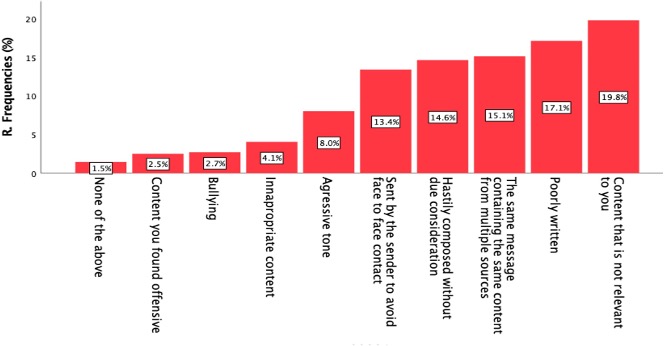
Of those who responded, most participants indicated that they had not attended any email training programs in the past year. The minority who did attend cited “software or hardware training” as the primary focus of such training, with the sample responding about equally to whether the training was relevant to their professional focus. No significant differences were found between men and women in attendance at such training or in the context of the age distribution.
Many respondents indicated that email use would grow in the future (88.6%), with 24.5% indicating that this growth would be related to qualifications, as shown in Figure 5. Respondents indicated that training (3.5%), the ability to implement alternatives (3.8%), and the ability to improve message relevance (4.1%) were needed to improve email. When respondents were asked what they thought was a barrier to effective email use, they cited excessive complexity (11.2%), time issues (4.8%), lack of necessary competence (3.4%), and interpersonal interaction (3.1%), as shown in Figure 6.
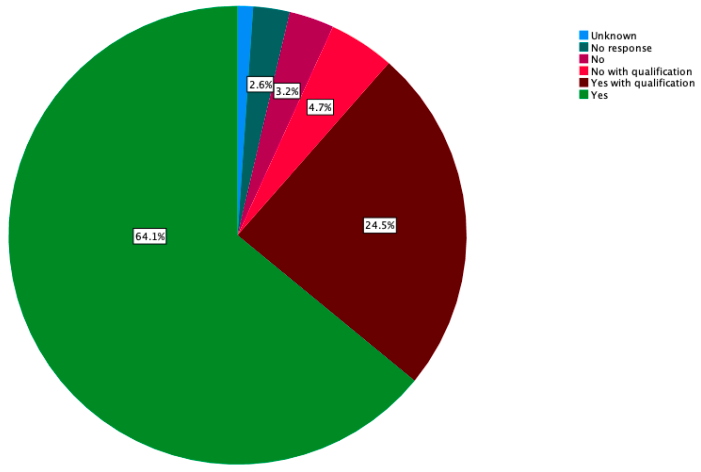
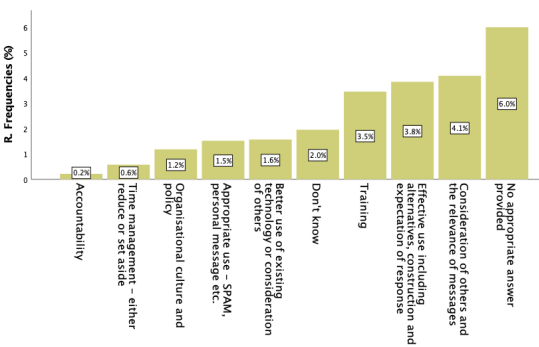
Bottom Line
A statistical analysis was conducted that showed that e-mail has potential: many respondents were convinced that e-mail use would grow in the future. One area for such growth is the potential work on bugs. The shortcomings and obstacles discovered for effective e-mail, namely time-consuming, technical difficulties, duplicate messages, and spam, should be the foundation for improving e-mail. The use of modern technology, including AI and machine learning, can be an effective strategy for improving the user experience (Kumar and Sonowal, 2020; Dada et al., 2019). Additional tools could be automatic checking of spelling, grammar as well as recipient correctness.
Reference List
Bae, J., et al. (2020) ‘Compassion satisfaction among social work practitioners: the role of work–life balance’, Journal of Social Service Research, 46(3), pp. 320-330.
Ceci, L. (2022) Number of e-mail users worldwide 2017-2025. Web.
Cosmas, E. (2022). The benefit of email and social media as potent tools for orientation and staff students interaction in Enugu state college of education technical, Enugu. Web.
Dada, E.G., et al. (2019) ‘Machine learning for email spam filtering: review, approaches and open research problems’, Heliyon, 5(6), pp. 1-23.
Ihsan, F., Chohadry, K., and Aslam, S. (2021) ‘Role of social media on educational performance of university students’, Journal of Education and Social Studies, 2(1), pp. 20-29.
Kelliher, C., Richardson, J. and Boiarintseva, G. (2019) ‘All of work? All of life? Reconceptualising work-life balance for the 21st century’, Human Resource Management Journal, 29(2), pp. 97-112.
Kumar, N., and Sonowal, S. (2020) Email spam detection using machine learning algorithms. Web.
Nasheena (2022) Email marketing data – unique identifiers, duplicate emails & generic addresses. Web.
Short, J. (2023) The 11 best email management software + features to look for. Web.
Vergelis, M., et al. (2019) Spam and phishing in 2018. Web.